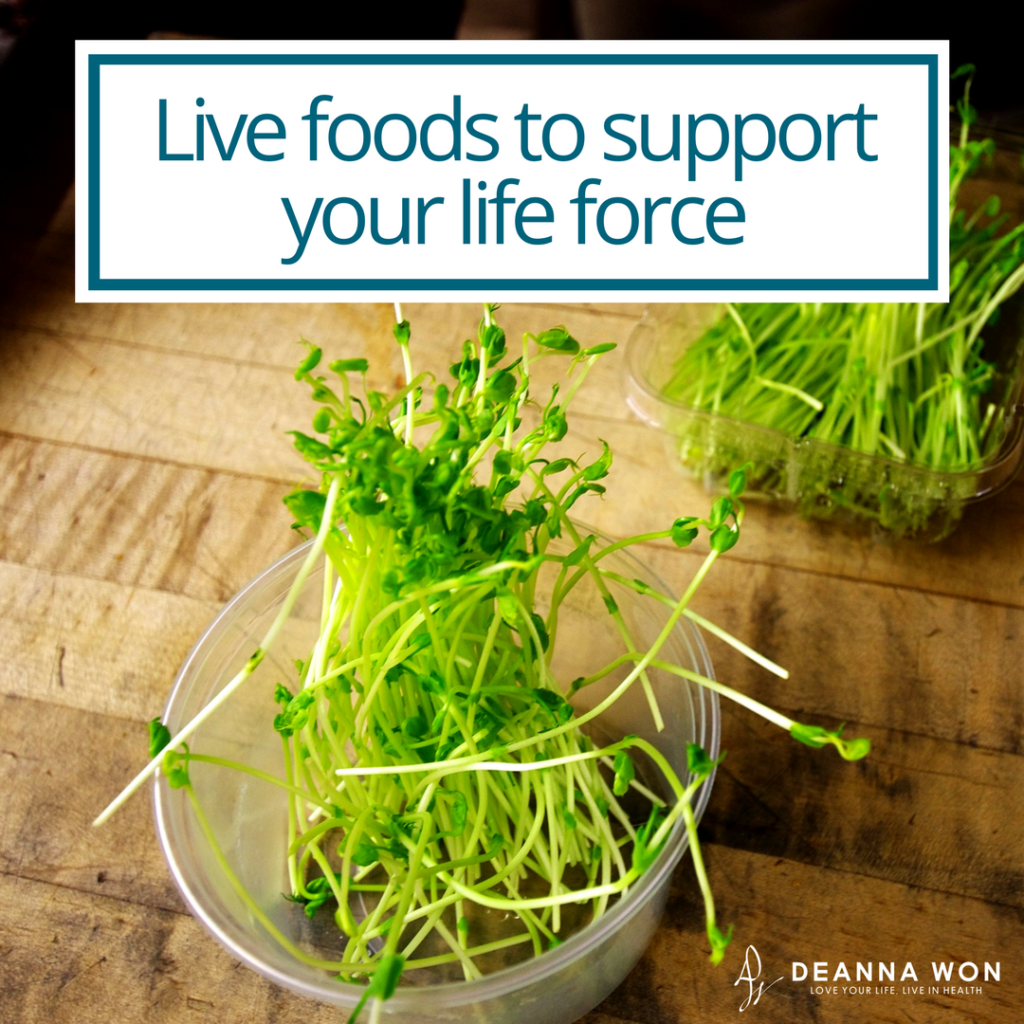If you’re considering a raw vegan diet, you may be wondering, where do you get your protein from? Many are under the impression that animal-based products are the best, if not the only, way to get protein. However, sprouts are superfoods unto themselves, not only for their protein, but for the enzymes, phytonutrients, vitamins, minerals that our bodies need for optimal health. Not only that, but amazingly, sprouts are 10 to 50 times more nutritious than their adult plant counterparts.
This is because seeds inherently contain everything that they need to grow into full-grown plants. Sprouts are essentially “baby plants,” but don’t let their size fool you. While they may look somewhat fragile, their nutrient content significantly eclipses that of their adult plant versions. When you soak a seed to have it germinate or sprout, a tremendous spark of energy occurs, causing that dormant seed to appear to suddenly become alive. When you consume these sprouts, this same spark of energy transfers into your body.
In this early phase of the plants’ development, they contain high amounts of concentrated vitamins and minerals that make them a better source of nutrition than in their more mature stages. As a matter of fact, the vitamin content of Vitamins A, B-complex, C, and E increases by “up to 20 times the original value within only a few days of sprouting.”1 Additionally, lysine, an amino acid that is essential for the production of enzymes and hormones, is also found in much higher quantities in sprouts. As the plant develops into its full-grown form, the quantities of lysine, and other essential nutrients, lessen.
How Can Sprouts Benefit Your Health?
Reduces Oxidative stress. Sprouts contain antioxidants which assist the body in maintaining the balance of free radicals. When there are too many free radicals in the body, they cause cellular damage, which increases the risk for the development of diseases, such as cancer. By consuming antioxidant-rich foods, you’re able to remove these excessive free radicals.
Improves digestion. Sprouts contain proteolytic enzymes that help the body digest proteins and carbohydrates.2 Our bodies require enzymes to break down the foods that we eat so that we’re able to have the energy needed to function. Although our bodies are capable of producing these enzymes, we essentially force our bodies to make a critical decision when we continue to eat food that lack enzymes: the decision as to whether to create proteolytic enzymes or to create other enzymes that our bodies need to function. When the body has to make this decision too often, it begins to lose its ability to create the necessary enzymes to digest these complex foods. In fact, by the time most people reach their 40’s, their pancreas becomes less able to meet the demands of generating the enzymes needed to digest foods. This is why the elderly often complain of digestive issues. By incorporating more sprouts in your diet, you are providing your body with a rich source of enzymes.
Assist in elimination. Sprouts contain a high amount of fiber, which aids the body in removing toxic substances, to include excess hormones, like estrogen, from the body. This process reduces the amount of waste stored in the body, and thus, results in less stress on the kidneys, liver, and heart, while maintaining a healthy weight.
Builds up red blood cells. With a low red blood count, you may experience symptoms like fatigue, nausea, inability to focus, or brain fog. 4 Without enough red blood cell production, a condition known as anemia can develop. Copper is an important trace mineral found in sprouts that helps the body to utilize iron and oxygen in the blood and contributes to cellular growth and repair. 5 Although this mineral is required by the body to carry out many enzymatic functions, it cannot be produced by the body. Therefore, it is crucial to eat food that contains trace amounts of copper in order to prevent a deficiency. Sunflower sprouts contain 80% of the recommended daily allowance of iron so is a good sprout to include in your diet.
Cleanses blood. Sprouts, like all plants, contain chlorophyll, which is excellent for oxygenating and detoxifying the blood as well as protecting the body from cancer.3 Clover sprouts and deacon sprouts, as you’ll see below, are known for their amazing ability to detoxify the liver and cleanse the blood.
Improves heart health. The body requires essential fatty acids (EFAs) such as Omega-3 and Omega-6 in the proper ratio for healthy brain and cardiovascular function.6 Although the body requires these EFAs, they cannot be produced by the body. We must consume them through our food sources, like sprouts, to reap their benefits.
Supports immune function. Ample in a number of nutrients, sprouts contain Vitamins A and C which stimulate the production of white blood cells called lymphocytes. These lymphocytes help to fight off infection and foreign invaders like bacteria, cancer cells, and toxins.7
What Are Some Sprouts to Keep in Your Kitchen?
Sunflower sprouts. As a fully-grown plant, sunflowers are beautiful bright flowers that produce seeds often consumed as snacks. However, sunflower sprouts are packed with protein, Vitamin D, Vitamin E, calcium, copper, fiber, iron, lecithin, phosphorus, magnesium, and potassium. 8, 9 Sometimes referred to as the “king of sprouts,” the high trace mineral content of this sprout makes it very beneficial in maintaining healthy bones, muscle, and red blood cells, as mentioned above. Additionally, the majority of the calories from sunflower sprouts come from its high-fat content, which makes the sunflower a source for oil. 10
Broccoli sprouts. Broccoli sprouts contain glucosinolates, which are a large group of sulfur-containing glucosides, or molecules derived from glucose. To release glucosinolates for our digestion, myrosinase is an enzyme that is found in cruciferous vegetables, which converts glucosinolates into isothiocyanates, which can prevent and protect from cancer. 11 Johns Hopkins discovered in their research that sulforaphane, a phytochemical belonging to the isothiocyanates family found in these powerful sprouts, protects cells from becoming malignant. According to Paul, Talalay, M.D., Profesor of Pharmacology, young broccoli sprouts contain “20 to 50 times the amount of chemoprotective compounds found in the mature Broccoli.”
Sulforaphane occurs “10-100 times” greater in broccoli sprouts than in broccoli. It also causes the body to release glutathione, the master antioxidant that neutralizes carcinogens before they damage the DNA. 12 While present in cruciferous vegetables sulforaphane, broccoli sprouts are an especially rich source of it.
Clover sprouts are helpful in detoxifying the liver. These sprouts are high in calcium and contain phytoestrogens that are actually helpful for hormonal balance and cancer-fighting isoflavones. This sprout is also rich in iron, phosphorous, magnesium and potassium, Vitamins A, B, C, and K.13 It is very helpful in cleansing the blood and boosting blood circulation.
Daikon Sprouts. Also known as kaiware sprouts, is rich in Vitamins A, B1, B2, B6, C, iron, and fiber. This sprout also acts as an expectorant and eliminates parasites from the digestive tract. 14 Daikon sprouts are also very good at cleansing and purifying blood and improving circulation. These tend to be spicier sprouts, so it’s a good idea to include these sprouts with other vegetables if you’re intolerant of the heat.
Pea Shoots. A one cup serving of pea shoots provide about 35% of your Vitamin C daily value, 66% of your Vitamin K daily value, and 15% of your Vitamin A daily value.15 Pea shoots are an excellent great source of antioxidants, carotene, and folate, all of which help to reduce cellular damage and prevent cancer.
Fenugreek Sprouts. Although fenugreek sprouts are rich in a number of nutrients, these sprouts are especially rich in fiber, protein, and iron. 16 This sprout cleanses the digestive system and reduces inflammation. 17 It’s common in Indian cuisine to use fenugreek seeds and sprouts to balance and control blood sugar levels, which is especially helpful in diabetes.
How Do You Consume Sprouts?
In order to reap all of the benefits from these powerful plants, it’s important to consume them raw. Cooking sprouts will destroy the digestive enzymes and diminish their nutritional content. However, if you have to, you can lightly steam or sautée them.
You can enjoy sprouts in a salad, meal, green smoothies, and in green juices. To get enough protein in your diet, sprouts should comprise at least 50% of your salads, smoothie content, and juices. By adding sprouts to your vegetable dishes, your hunger will be satiated because your body is receiving the nutrition that it needs.
Because sprouts are still alive when consumed raw, and will actually grow if you plant them, they are referred to as a living food. This living food provides the essential nutrition and energy that the human body needs to function optimally. If you haven’t already, definitely try including these amazing living foods into your diet. You may find that your need for other protein sources will diminish while your energy improves.
Do you have a recipe that involves these powerful living foods? I’d love to possibly share and feature it on my site. Please let me know in the comments below!
Ready to make your health a priority? Contact me here to schedule your consultation.
References:
- Schoffro Cook, M. (n.d.).[Is this the APA way of indicating ‘no date’?] 10 Reasons to Eat Sprouts | Care2 Healthy Living. Retrieved April 15, 2018, from https://www.care2.com/greenliving/10-reasons-to-eat-sprouts.html
- Mercola, J., MD. (n.d.). What Are Sprouts Good For? Retrieved April 15, 2018, from https://foodfacts.mercola.com/sprouts.html
- Benefits of Eating Sprouts. (2014, January 20). Retrieved April 15, 2018, from https://www.sproutliving.com/benefits-of-eating-sprouts/
- 11 Best Benefits of Sprouts. (n.d.). Retrieved April 16, 2018, from https://www.organicfacts.net/health-benefits/seed-and-nut/sprouts.html
- Copper Deficiency Symptoms & Sources to Cure it! (n.d.). Retrieved April 16, 2018, from https://draxe.com/copper-deficiency/
- Group, E., DC. (2015, October 14). The Health Benefits of Omega 3, 6, 9 Fatty Acids and EPA & DHA? Retrieved April 16, 2018, from https://www.globalhealingcenter.com/natural-health/benefits-of-omega-3-6-9-fatty-acids/
- Paula, E. (2017, August 14). What Vitamins Are Needed to Increase White Blood Cells? Retrieved April 16, 2018, from https://www.livestrong.com/article/362153-what-vitamins-are-needed-to-increase-white-blood-cells/
- Biswas, D. (n.d.). Top 8 Health Benefits of Sprouts for Weight Loss. Retrieved April 15, 2018, from https://www.thefitindian.com/sprouts-for-weight-loss/
- Blue, K. (n.d.). Sprouts the Living Super Food. Retrieved April 15, 2018, from https://hippocratesinst.org/sprouts-the-living-super-food Hereafter abbreviated STLSF
- Corleone, J., RDN, LD. (2017, October 03). The Nutrition in Sunflower Sprouts. Retrieved April 16, 2018, from https://www.livestrong.com/article/524936-the-nutrition-in-sunflower-sprouts/
- Won, D. (2015, August 31). Are We More Bacteria than Human? | Keynotes to Life | Love Your Life, Live In Health. Retrieved April 16, 2018, from http://deannawon.com/are-we-more-bacteria-than-human/
- STLSF
- Nutrition Facts & Health Benefits of Clover Sprouts. (2018, February 09). Retrieved April 16, 2018, from https://www.organicfacts.net/clover-sprouts.html
- STLSF
- 6 Health Benefits of Pea Shoots. (2012, August 2). Retrieved April 17, 2018, from https://www.healthdiaries.com/eatthis/6-health-benefits-of-pea-shoots.html
- Renee, J., MS. (2017, October 03). Fenugreek Sprout Nutrition. Retrieved April 17, 2018, from https://www.livestrong.com/article/226793-fenugreek-sprout-nutrition/
- STLSF
- Wellness, B. (2016, June 1). Types of Sprouts: Alfalfa Sprouts, Mung Bean Sprouts, Sunflower Sprouts, and More. Retrieved April 15, 2018, from http://www.berkeleywellness.com/healthy-eating/food/article/types-sprouts
- Lehman, S., MS, & Fogoros, R. N., MD. (2017, November 24). Do Vegetables High in Glucosinolates Help Fight Cancer? Retrieved April 16, 2018, from https://www.verywellfit.com/what-are-glucosinolates-and-why-are-they-good-for-me-2505908
- (n.d.). Retrieved April 16, 2018, from http://www.phytochemicals.info/phytochemicals/isothiocyanates.php
- What is Kaiware Daikon (Radish Sprouts)? (n.d.). Retrieved April 16, 2018, from http://welovejapanesefood.com/what-is-kaiware-daikon/

